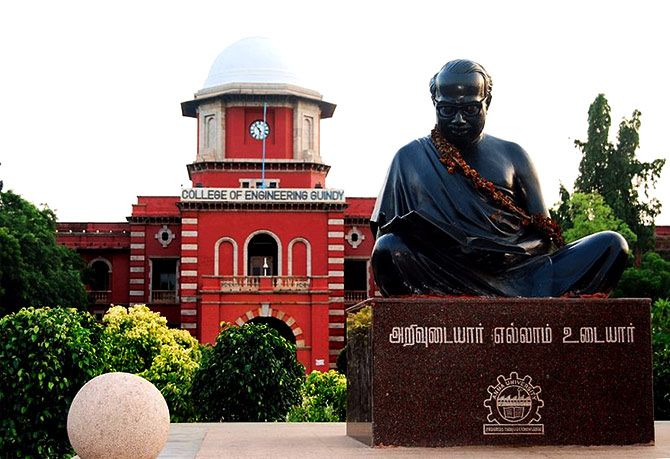If a students fails an examination, first s/he applies for revaluation.
The student then approaches 'brokers', either from among the teachers or outside the university.
A student pays Rs 10,000 for the broker's assistance, which ensures that marks will be upwardly revised in the revalution.
A Ganesh Nadar/Rediff.com reports.

The Anna University was established on September 4, 1978 and named after the late C N Annadurai, the former chief minister of Tamil Nadu. It offers higher education in engineering, technology, architecture and applied sciences.
The university was formed by bringing together and integrating four well known technical institutions in Chennai -- the College of Engineering (established in 1794), the Alagappa College of Technology (established in 1944), the Madras Institute of Technology (established in 1949) and the School of Architecture and Planning (established in 1957).
The university's reputation was shaken by a revaluation scandal six years ago, in 2012. Certain students's marks were revaluated and they subsequently passed with flying colours.
After an enquiry, some officials and professors were suspended. While the officials went scot-free, some professors are still under suspension though the case could not be proved for lack of evidence.
Even as the university was coming to terms with this blot on its reputation, Tamil Nadu's directorate of vigilance and anti-corruption unearthed another scam last month in the revaluation of marks and booked 10 academicians associated with the university for the same.
According to Dr I Arul Aram, president, Anna University Teachers Association, the 2018 revaluation scam is just "the tip of the iceberg. Corruption is present on a much larger scale in attendance, appointments and revaluation."
The scam's modus operandi is simple.
If a students fails an examination, first s/he applies for revaluation.
The student then approaches 'brokers', either from among the teachers or outside the university.
One 'broker' goes under the name 'Friend of the Universe'.
A student pays Rs 10,000 for the broker's assistance, which ensures that marks will be upwardly revised in the revalution.
How is the revaluation done?
A second evaluator looks at the answer paper and gives her/his marks.
If the marks are slightly higher or lower than the original marks, the matter rests.
If the marks go up by more than 15, or the grade improvement is more than 2, then the answer paper goes to a third examiner who gives her/his marks.
The two sets of marks are then compared and the higher marks are given to the student.
Let's say, for example, that a student gets 7 marks the first time.
After revaluation, s/he gets 47 marks.
Since the difference in the marks is more than 15, the answer paper goes to the third examiner who gives it 77 marks.
Since 47 and 77 are closer (the difference is 30) than 7 and 47 (the difference is 40), the student gets 77 marks.
According to Arul Aram, the scam didn't stop despite the enquiry in 2012; it just became irregular.
This time, the scamsters got caught because they institutionalised the cash for marks.
"We noticed that lots of students were applying for revaluation," Tamil Nadu's then higher education secretary Sunil Paliwal told Rediff.com. "Most of them might be genuine cases. We instituted an enquiry only into those cases where the revalued marks were much higher than the original marks."
Paliwal filed a complaint with Tamil Nadu's directorate of vigilance and anti-corruption. The DVAC investigated the matter and, within days, the controller of examinations and nine others were suspended from the university.
The DVAC has filed cases of cheating and forgery against them. They have also been accused of destroying evidence (the original answer papers).
Professors from the four constituent colleges have been repeatedly telling the media that the scam only took place in the 510 colleges affiliated to Anna University and not at their institutions.
"Colleges do not send their best professors for correction, or maybe the best professors are just not interested in correcting papers," says a senior official, speaking on condition of anonymity, adding, "So we have mediocre correctors."
"As there is no accountability, we don't even know whether the corrector reads the entire paper," the official adds.
"We give them an answer key on the very first day, but most don't even read it. Some don't even come on the first day as they know that the actual paper correction starts the next day," the official explains.
Aram says the latest scam was exposed because of the brazen way in which the scamsters were going about it.
"What has been happening since 2012 never came out because the earlier players had finesse," he says.
Along with the academics, students indicted in this scam will have to face the consequences of their actions.
According to the Prevention of Corruption (Amendment) Bill, 2018, anyone who gives a bribe can be sentenced to seven years in prison.
Moreover, the students could be expelled from the university.










